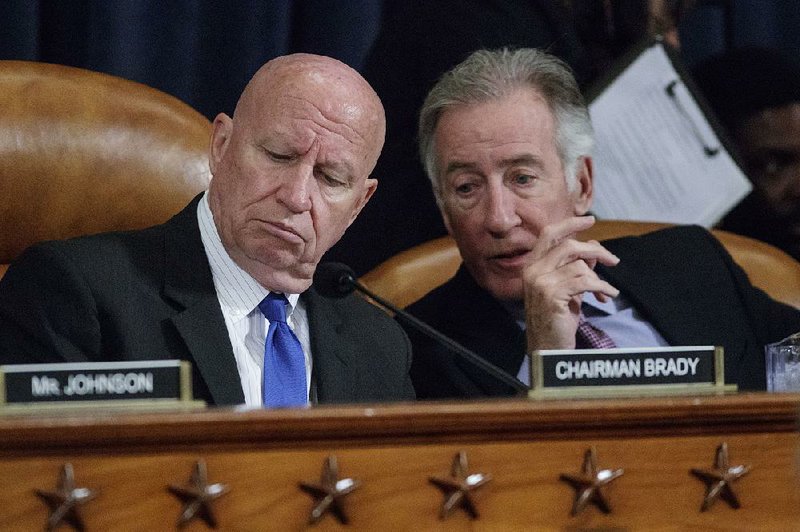WASHINGTON -- House Speaker Paul Ryan worked to rally divided Republicans behind their drive to overhaul the nation's health care system Wednesday, praising his party's legislation as "what good, conservative health care reform looks like" as lawmakers cast Congress' first votes.
"This is the covenant we made with the American people when we ran on a repeal-and-replace plan in 2016," Ryan said at a news conference Wednesday on Capitol Hill. "I have no doubt we'll pass this, because we're going to keep our promises."
Republican leaders by week's end wanted to push their measure through two House committees -- Ways and Means, and Energy and Commerce. But they hit resistance from Democrats who oppose the GOP effort to unravel the Patient Protection and Affordable Care Act.
Outnumbered Democrats used the panels' sessions for political messaging Wednesday, offering amendments aimed at preventing the bill from raising deficits, kicking people off coverage or boosting consumers' out-of-pocket costs. They even tried, unsuccessfully, to insert language pressuring President Donald Trump to release his income-tax returns.
[INTERACTIVE: Compare new health care proposal with Affordable Care Act]
"This bill suffers from an identity crisis," said Rep. Richard Neal of Massachusetts, the top Democrat on the Ways and Means Committee. "Is this health care, or is this a tax-cut bill?"
But the biggest challenge for Republican leaders was coming not from Democrats but from rebellion in their own ranks.
In words aimed at his own recalcitrant colleagues, Ryan, R-Wis., declared the legislation "is bold and it is long overdue. And it is us fulfilling our promises."
White House spokesman Sean Spicer said Trump administration officials, including the president himself, are engaged in a "full-court press" to sell the health care bill through local radio and television interviews and meetings with stakeholders.
[PRESIDENT TRUMP: Timeline, appointments, executive orders + guide to actions in first 100 days]
Spicer said that while the president is always open to negotiations or good ideas, the House bill is what the president is backing and plans to make a case to the American public.
"He's in very much of a sell mode," Spicer said. "The president is very proud of the product we have produced."
At the same time, Spicer sought to pre-emptively discredit the nonpartisan budget analyst that is preparing to report on how much the bill will add to the federal deficit.
Next week, the Congressional Budget Office will also forecast how many people could lose coverage if the measure is enacted, an area where the Republican plan is vulnerable.
"If you're looking to the CBO for accuracy, you're looking in the wrong place," Spicer said, accusing the office of mistakes in its forecasts about the Affordable Care Act.
Ryan also sought to mute complaints that the measure was released without a cost estimate from the Congressional Budget Office, calling the situation "very common" and vowing the numbers would be available next week.
"This is a monumental, exciting conservative reform," he said of the plan in a bid to woo critics on the right. "I've been working on this for 20 years. This is exciting. This is what we've been dreaming about doing."
Meetings With Trump
The White House has spent several days targeting skeptical conservatives in a behind-the-scenes "charm offensive," said Sen. Rand Paul, R-Ky., who has emerged as the bill's chief skeptic.
"Every conservative that's come out publicly opposed to this has been called by the White House and is being cajoled and wooed by the White House to give in," Paul said during an interview with MSNBC's Morning Joe on Wednesday.
Conservatives who met late Tuesday with White House budget chief Mick Mulvaney flashed optimism that the bill could be reworked. Rep. Trent Franks, R-Ariz., told reporters that Mulvaney said that "essentially whatever the Congress could do to improve the bill, that the White House was open."
Trump was to meet again with conservative leaders at the White House to discuss their concerns, Spicer said.
Underscoring Trump's potential impact, Energy and Commerce Committee Chairman Greg Walden, R-Ore., said of GOP holdouts, "A lot of them, they maybe haven't felt the inertia that comes with Air Force One landing in their district."
The bill also faces criticism from potent outside groups, including organizations instrumental in the 2010 enactment of Obama's overhaul. On Wednesday afternoon, all major hospital groups, including the American Hospital Association, the Association of American Medical Colleges, the Catholic Health Association of the United States and the Children's Hospital Association, came out against the Republican bill.
"As organizations that take care of every individual who walks through our doors, both due to our mission and our obligations under federal law, we are committed to ensuring health care coverage is available and affordable for all," the groups wrote. "As a result, we cannot support the American Health Care Act as currently written."
"We cannot support the AHCA as drafted because of the expected decline in health insurance coverage and the potential harm it would cause to vulnerable patient populations," American Medical Association chief executive James Madara, a doctor, wrote in a letter sent to committee leaders overseeing work on the measure.
The legislation would remove Obama's requirement that everyone buy insurance -- a provision deeply disliked by Republicans -- by repealing the tax fines imposed on those who don't. The bill would replace income-based subsidies Obama provided with tax credits based more on age, and insurers would charge 30 percent higher premiums for customers who drop coverage for over two months
The extra billions Washington has sent states to expand the federal-state Medicaid program would begin ending in 2020, and spending on the entire program would be capped at per-patient limits. About $600 billion in 10-year tax boosts that Obama's statute imposed on wealthy Americans and others to finance his overhaul would be repealed. Insurers could charge older customers five times more than younger ones instead of the current 3-1 limit, but would still be required to include children up to age 26 in family policies, and they would be barred from imposing annual or lifetime benefit caps.
Democrats said the Republicans would yank health coverage from many of the 20 million Americans who gained it under Obama's statute, and drive up costs for others because the GOP tax breaks would be skimpier than existing subsidies. And they accused Republicans of hiding bad news by moving ahead without official estimates from the nonpartisan Congressional Budget Office on the bill's cost to taxpayers and anticipated coverage.
On the Republican side, conservatives in particular were up in arms, saying the tax credits would be too expensive and the phaseout of Obama's Medicaid expansion too slow. One conservative group, FreedomWorks, was releasing digital and social media ads opposing the legislation, while others like Americans for Prosperity, backed by the wealthy Koch brothers, were working against the legislation.
"It's way more cost and we're already bankrupt," Rep. Dave Brat, R-Va., said of the GOP measure.
To reporters, Ryan played down the conservative rebellion, describing it as a temporary reaction from Republicans who have never held office under unified GOP control.
"We're going through the inevitable growing pains of being an opposition party to being a governing party," he said. "It's a new feel, a new system for people."
Buttressing Republicans, the U.S. Chamber of Commerce was backing the bill. The American Action Network, a political group tied to House GOP leaders, has spent nearly $8 million this year on TV and digital ads supporting the legislation in 75 House districts, mostly held by Republicans.
Meanwhile, Republicans in the Senate have complained that the legislative process is still moving too quickly.
"I don't think we need to introduce legislation on Monday and have one chance to amend it on Wednesday," Sen. Tom Cotton, R-Ark., said on Morning Joe, referring to the House committee hearings.
"I want to get it right. I don't want to get it fast. And the Senate certainly will not just be jammed with whatever the House sends over here," he said.
Several Republican senators complained Tuesday afternoon that Trump does not fully grasp the Senate's slower pace or its concerns.
"If [passage] takes months or a year, so be it," said one Republican senator, who spoke on the condition of anonymity because negotiations are ongoing.
The senators said there is confusion about who is managing the process and which administration figures, if any, have the power to sway Trump.
Walden dismissed criticism that Republicans were rushing their bill through.
"It's kind of funny," he said. "In the first couple of months we were accused of moving too slowly and not having a plan. We're doing this step-by-step, major process."
U.S. Drug Pricing
Meeting separately with Democrats at the White House on Wednesday, Trump told lawmakers that he wants to do something about U.S. drug prices, according to a lawmaker at the meeting.
Democratic Reps. Elijah Cummings of Maryland and Peter Welch of Vermont presented Trump with a bill to have Medicare directly negotiate drug prices with manufacturers, and also talked about the price of EpiPen, Mylan NV's emergency allergy shot that became a focus for critics of high pharmaceutical prices.
Trump was "enthusiastic" about the topic of drug pricing, Cummings told reporters after the meeting. "He was clearly aware of the problem and he made clear to us he wanted to do something about it."
"He knew there was a whole group of lobbyists and a lot of money being poured into this," Cummings said of the drug industry.
U.S. drug prices have been a frequent target for Trump, and he's threatened to use the government's buying power to force prices down -- but so far has not unveiled any specifics. On Tuesday, Trump sent pharmaceutical stocks falling with a tweet where he promised to lower medicine costs and said he's working on a "new system where there will be competition in the drug industry."
Information for this article was contributed by Alan Fram, Ricardo Alonso-Zaldivar, Erica Werner, Andrew Taylor, Kevin Freking and Mary Clare Jalonick of The Associated Press; by Elise Viebeck, Mike DeBonis and Juliet Eilperin of The Washington Post; by Abby Goodnough, Thomas Kaplan, Robert Pear and Emmarie Huetteman of The New York Times; and by Billy House, Jared S. Hopkins and staff members of Bloomberg News.
A Section on 03/09/2017

